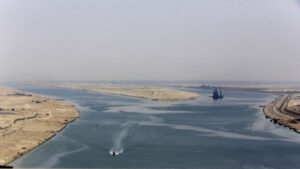
The United Nations trade body has expressed serious concerns about the disruptions in global trade due to a series of critical issues including Red Sea attacks, the ongoing war in Ukraine, and historically low water levels in the Panama Canal. Jan Hoffmann, a trade expert at the United Nations Conference on Trade and Development (UNCTAD), highlighted the ripple effects of these disruptions, noting a surge in shipping costs and subsequent impacts on energy and food prices, potentially escalating inflation globally.
The situation in the Red Sea has been particularly alarming since November, with the Houthi rebels, backed by Iran, launching multiple attacks on shipping routes leading to Egypt’s Suez Canal. This vital waterway, which accommodated 12 to 15 percent of global trade in 2023, has seen a dramatic 42 percent drop in trade volume in the last two months due to these hostilities.
The conflict in Ukraine, ignited by Russia’s invasion in February 2022, has further complicated the global trade landscape, reshaping oil and grain trade routes, particularly through the Black Sea region. Additionally, a severe drought has led to the lowest water levels in the Panama Canal in decades, significantly reducing the canal’s capacity and affecting the volume of global trade that relies on this crucial passage.
The situation is particularly dire for the shipping of grains and other commodities from Europe, Russia, and Ukraine. The crisis in the Red Sea has led to heightened costs for consumers and poses significant threats to global food security, notably affecting regions heavily dependent on wheat imports from Europe and the Black Sea region, such as East Africa, South Asia, Southeast Asia, and East Asia.
UNCTAD’s early data for 2024 indicates that over 300 container vessels, accounting for more than 20 percent of the global container capacity, are either diverting or seeking alternatives to bypass the Suez Canal. Many are opting for the longer and more expensive route around the Cape of Good Hope in Africa. Notably, ships carrying liquefied natural gas have ceased transiting through the Suez Canal due to fears of attacks.
The financial implications of these disruptions are stark, with average container shipping spot rates from Shanghai witnessing a significant increase: a 122 percent rise since early December, while rates to Europe and the U.S. west coast have surged by 256 percent and 162 percent, respectively.
As the international community grapples with these multifaceted challenges, the UN’s alert underscores the urgent need for a coordinated global response to mitigate the impact on trade, economy, and food security worldwide.






















Comments are closed for this article!